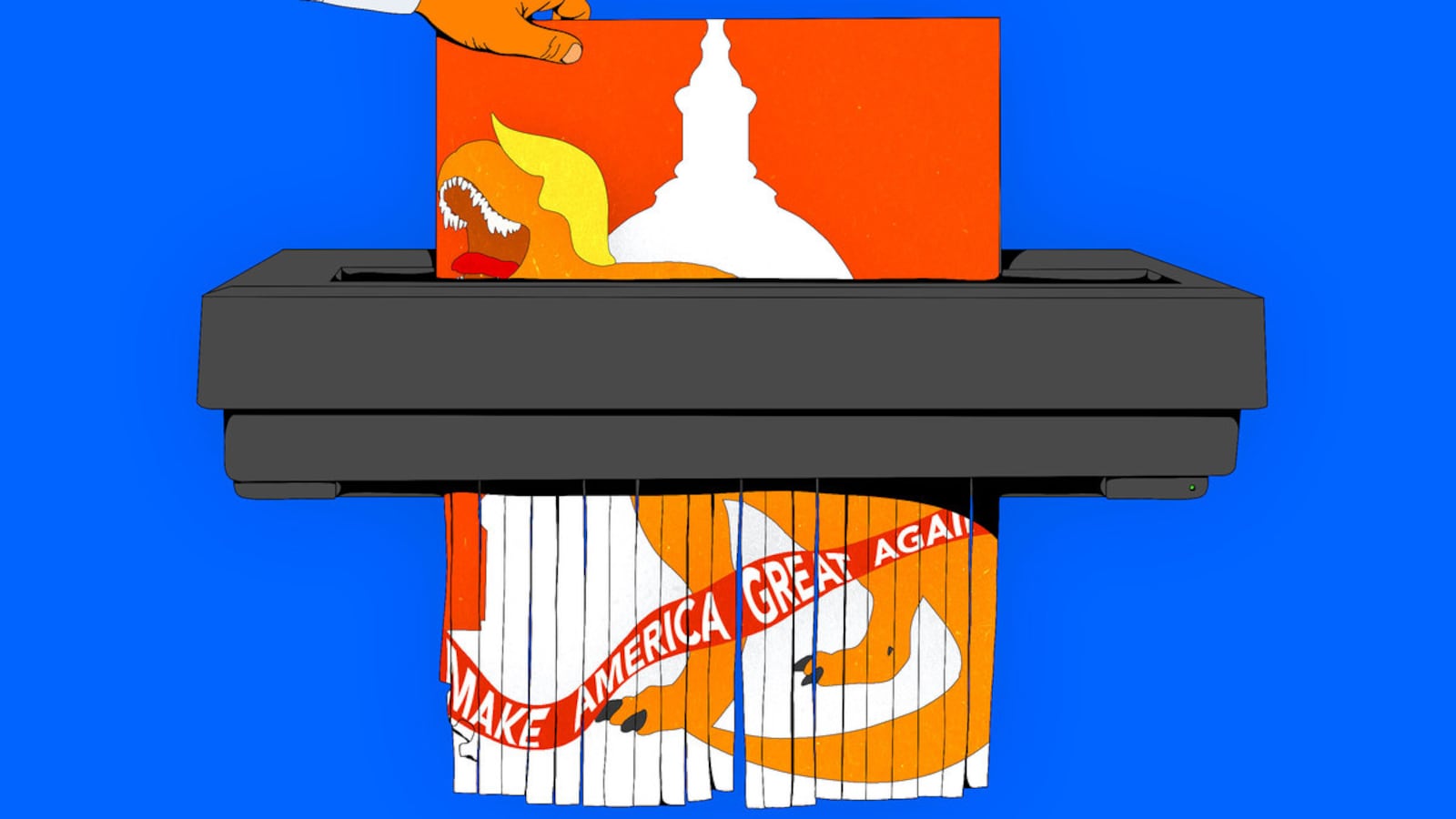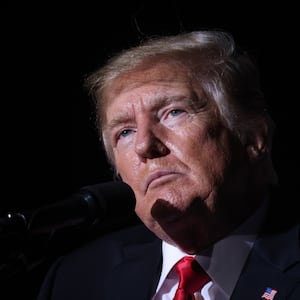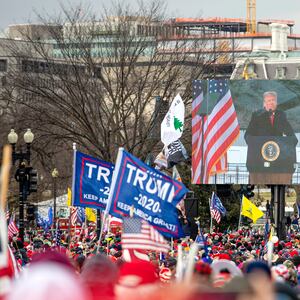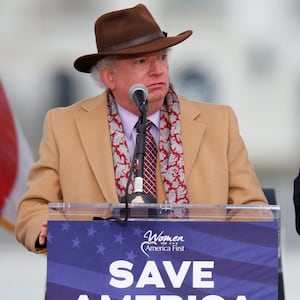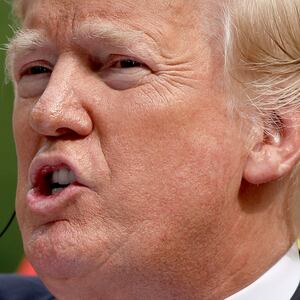A federal judge ruled late Tuesday night that former President Donald Trump’s sensitive White House records should, in fact, be turned over to congressional investigators looking into the former executive’s role in fueling the Jan. 6 Capitol insurrection.
Whether it’ll actually happen is still a bit of a question—almost immediately Tuesday night Trump’s legal team filed an appeal—but lawmakers are closer than ever to acquiring internal communications within the White House around Jan. 6. And the National Archives, which is in possession of the records, has said it plans to hand over documents Friday unless a court stops them.
That appears to be unlikely at the moment.
Three weeks ago, Trump sued the chairman of the select committee conducting the investigation, Rep. Bennie Thompson (D-MS), in an attempt to assert executive privilege and block the National Archives from releasing records of internal White House communications before and during the assault on the nation’s democracy.
U.S. District Judge Tanya S. Chutkan, however, ruled that she would not step in the way of the Archives turning over those records.
“The court holds that the public interest lies in permitting—not enjoining—the combined will of the legislative and executive branches to study the events that led to and occurred on January 6, and to consider legislation to prevent such events from ever occurring again,” she wrote.
Chutkan agreed with the committee that this is “a matter of unsurpassed public importance because such information relates to our core democratic institutions and the public’s confidence in them.”
The judge added that Trump’s last ditch effort to keep key details secret would likely fail in a prolonged court battle anyway.
Thompson was informed of the judge’s decision during an interview with CNN host Chris Cuomo at 9:16 p.m., and he welcomed the news, noting that this congressional investigation would not be deterred.
Trump’s political director of communications, Taylor Budowich, issued a statement late Tuesday saying that this battle “was destined to be decided by the Appellate Courts.”
“Pres. Trump remains committed to defending the Constitution & the Office of the Presidency, & will be seeing this process through,” he wrote on Twitter.
His decision to raise the fight to the appellate court could stall the National Archives and Records Administration from releasing it by its deadline this Friday.
The autocratic former president—who refused to concede, deployed associates across the nation to undermine faith in election results, and tried to strong-arm Georgia’s top elections official to “find” nonexistent votes—laid out a bizarre legal theory in this lawsuit.
His lawyer, Jesse Binnall, argued that Trump could still assert executive privilege with the expectation that current President Joe Biden must abide by it. Legal scholars immediately noted that the argument is nonsensical, given the obvious fact that Trump is no longer president, and his successor is under no obligation to abide by his wishes.
Chutkan touched on that in her opinion, ripping into Trump for attempting to assert expanded power.“Plaintiff does not acknowledge the deference owed to the incumbent President’s judgment. His position that he may override the express will of the executive branch appears to be premised on the notion that his executive power ‘exists in perpetuity.’ But Presidents are not kings, and Plaintiff is not President,” she wrote.
Within hours, Thompson issued a statement thanking the judge for her ruling, accusing Trump’s lawsuit of being “little more than an attempt to delay and obstruct our investigation.”
“The presidential records we requested from the National Archives are critical for understanding the terrible events of January 6th,” he said in the statement. “The Select Committee’s investigation is moving forward swiftly and we look forward to receiving these important records from the National Archives.”
In something of an ironic twist, Chutkan cited the legal precedent established by the Supreme Court in 2020 when justices effectively hampered Congress’s efforts to get Trump’s long-secretive tax returns. She subjected Trump’s legal arguments to a four-prong test set by that case, and appeared to be heading off an eventual appeal to those same Supreme Court justices by noting that previous concerns about congressional harassment of a president over personal matters “are plainly not present here.”
She made clear that the issues this time around relate to Trump’s choices and decision-making process as president, a matter of grave importance for the Republic.
And this case does have the potential to climb up to the Supreme Court again, given that it’s the first time since a presidential records law was enacted in 1978 that a sitting president refuses to honor his predecessor’s claim of executive privilege.
In fact, the Presidential Records Act was passed in the wake of the Watergate scandal, when President Richard Nixon resigned and indicated his intention to destroy administration tape recordings. Congress created the law to make the public the legal owners of presidential records, not the president himself.
The judge cited a Nixon case as well to support her stance that Biden can allow for the release of these records to Congress, because the current president—not Trump—“is best situated to protect executive branch interests.”
Trump’s assertion of privilege is misguided, because “it exists for the benefit of the Republic, not any individual.”
The nation’s archivist has indicated the agency will turn over more than 100 pages of relevant material to the congressional committee this Friday. The committee is expecting to receive communications, logs, and other digital files that would shed light on Trump’s involvement in fueling or directing the violent mob that tried to interrupt certification of Biden’s election victory.
For example, Thompson claimed on CNN tonight that he intends to review five unaired takes that Trump did when filming a video he released in the tense hours after the Jan. 6 insurrection, in which he tepidly called for insurrectionists to “go home” while still inciting them with accusations of a “fraudulent election.”
The archivist is set to turn over an additional 724-plus pages on November 26, and at least 551 pages some time after that.
“The court properly recognized that the committee—and the public—have a compelling interest in the records being released,” said David Janovsky, an analyst who focuses on separation of powers issues at the Project on Government Oversight.
The committee has issued several subpoenas to Trump associates, compelling them to provide closed-door sworn testimony and turn over documents. So far, only former White House chief strategist Stephen Bannon has completely resisted showing up—an act of defiance that got him referred to the Justice Department for criminal contempt.
On Tuesday, the committee issued 10 more subpoenas to Trump associates, including former White House press secretary Kayleigh McEnany, immigrant-hating senior adviser Stephen Miller, and several other associates of ex-President Trump.
Also among the list of fresh witnesses is retired Lt. Gen. Keith Kellogg, the national security adviser who was allegedly with Trump at the White House watching the insurrectionists attack the Capitol on TV—and urged the president to tweet something to cool down the violent mob.

